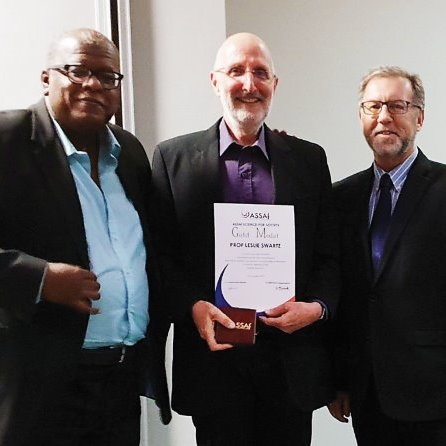
News

The future is greater inclusion, says award-winning scientist
TALI FEINBERG
A leading expert in the field of disability studies from the psychology department at Stellenbosch University, Swartz says he’s honoured by the recognition, which gives him a platform to talk to a broader audience about disability. He says it’s a tribute to his colleagues and all the people working to create a more inclusive world.
A clinical psychologist by training, Swartz has focused on questions of acceptance and participation throughout his career. “I’m interested in what kind of social conditions allow the most opportunities and the most people to participate and give of their best in society. I look at the ways we make the world inaccessible to people, including the physical environment and how to fix this. But the biggest barriers are social barriers, and they determine how we create our spaces. We are working towards a ‘barrier-free’ society.”
The fascination with inclusion comes from his own family history. “They say that if you scratch the surface, you will find that all psychologists are trying to understand their own life, and that’s true for me,” he quips. “My father had a range of physical impairments although he would never have called himself disabled. So I grew up conscious of the ways that people manage difference. It made me ‘research-minded’ as I want to explore why some people don’t fit into the world easily.”
Swartz says disability studies is an exciting field for young people, especially as technology and the digital world play a vital role in making the world more accessible for all. “Disability is linked to other changes in our society – climate change and natural disasters, more people with chronic illnesses and HIV, and an ageing population. There’s no doubt that the next big epidemic will be Alzheimer’s Disease. We need to look at what kind of world we are creating to accommodate a wider range of people who have disabilities of both body and mind. It’s a huge issue for the future.”
It’s astonishing how technology has managed to assist people with disabilities, Swartz says. For example, smartphones weren’t designed with disability in mind, but they help visually-impaired people to access reading through audio books – a world away from the clunky technology of the past. On the other hand, technology can sometimes make life harder for the disabled, so we need to pay attention to making sure everything from websites to devices are more inclusive.
Other exciting, cutting edge developments in the field are the use of “exoskeletons” to assist spinal-cord movement, and the design of wheelchairs for the African context, which often includes unpaved rural roads.
Swartz most enjoys working with younger people who have new ideas and challenge him. He has supervised more than 40 PhDs, many of them black, female, and disabled South Africans, who have in turn become leaders in disability work across southern Africa. His work has been used internationally in documents on disability and inclusion, and he is passionate about the inclusion of more disabled people in academia.
In 2018, he worked closely with the Cape Town Holocaust & Genocide Centre on its Deadly Medicine exhibition, which focussed on the abuse and murder of disabled people during the Holocaust and what this means for us today.
Swartz praises the Jewish community’s efforts at inclusion, particularly in Jewish schools. “We don’t want to have segregated schools or work, we want to include children and adults with a range of abilities. But this won’t work if you don’t have proper support. Jewish schools are really good at supporting inclusion.
“If you put a deaf child in a mainstream class, and don’t support them, that isn’t inclusion, it’s a form of abandonment. Herzlia in Cape Town has been particularly good at providing appropriate support. We need to scale this up across the community and in workplaces. The Jewish community has an understanding from generations past of what exclusion does to people in general. Just like we don’t want to exclude people on the basis of race or religion, we shouldn’t be excluding them on the basis of disability.”
Turning to mental health, Swartz says there has been an “enormous shift” in realising that mental-health problems are much more common than we used to think. “One in three or four people face a serious mental health problem – it’s extremely common. We need many more psychologists in public health, but often there aren’t jobs. In some African countries, there is one psychiatrist for the whole population! So we need to support ordinary people on the frontline.”
In conclusion, he believes that “every community should be involved in creating a more habitable planet. By allowing as much space and opportunities for people whose bodies and minds are not the same as ours, we will create a richer and much more diverse world.”




